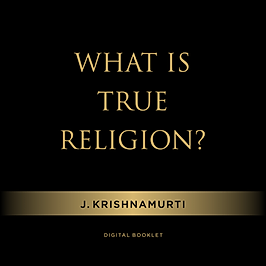DIGITAL BOOKLETS
The Future of Humanity in the Age of AI
Words such as computer, robot, and artificial intelligence were not in vogue when Krishnamurti spoke in the late ’50s and early ’60s about man’s technological progress; instead, he used words such as electronic brains, cybernetics, machines, and mechanical intelligence. But the prophetic vision of the sage saw, much ahead of time, the challenges that humanity is facing today from its own creations. This digital booklet brings together some of the compelling statements on the subject he made over the decades and their relevance in this age of artificial intelligence.
What is True Religion
‘What is true religion?’ is a question often posed by Krishnamurti in all his talks and writings. Implied in the question itself are the two aspects of his approach to the subject: what religion is not and what it is. This booklet addresses these timeless questions in the light of the current world situation, the latter being only an occasion to re�flect on the former.
Then There is Love
In the Life and Death of Krishnamurti, the biographer Mary Lutyens gives a delightful account of the origin of Freedom from the Known, which Krishnamurti asked her to compile, in 1967.
Later, after completing the book, she says the title was chosen by Krishnamurti himself and adds: ‘The chapter on love in the one I find the most beautiful and the most shattering.’ It is easy to see why this is so, for, she links what Krishnamurti says about love with almost every emotion that is not love: security and the demand to be safe in relationship, companionship, loneliness, jealousy, attachment, possessiveness, pleasure, sex, morality, respectability, fear, death, sorrow...
This digital booklet is a reproduction of that chapter.




